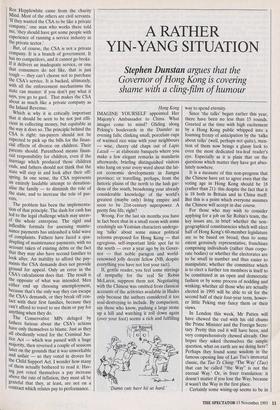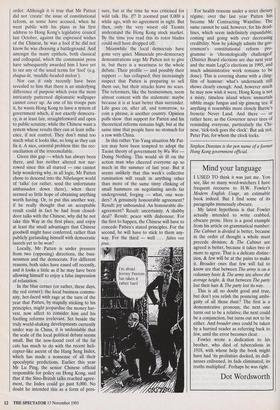A RATHER YIN-YANG SITUATION
Stephen Dunstan argues that the
Governor of Hong Kong is covering shame with a cling-film of humour
Hong Kong IMAGINE YOURSELF appointed Her Majesty's Ambassador to China. What images come to mind? Gliding along Peking's boulevards in the Daimler as evening falls; clinking small, porcelain cups of warmed rice wine with your neighbours — wise, cheery old chaps out of Lapis Lazuli — at elaborate banquets where you make a few elegant remarks in mandarin afterwards; briefing distinguished visitors who hang on your every word about the lat- est economic developments in Jiangsu province; or travelling, perhaps, from the historic plains of the north to the lush gar- dens of the south, broadening your already considerable knowledge of the world's greatest (maybe only) living empire and soon to be 21st-century superpower. A pretty fine life, right?
Wrong. For the last six months you have in fact been shut in a small room with some crushingly un-Yeatsian characters undergo- ing 'talks' about some minor political reforms proposed for Hong Kong — that egregious, self-important little spot far to the south — over a year ago by its Gover- nor — that noble paragon and world- renowned jolly decent fellow (NB, despite everything you have not lost your tact).
If, gentle reader, you feel some stirrings of sympathy for the real Sir Robin McLaren, suppress them not. Negotiating with the Chinese was omitted from classical accounts of the activities available in Hades only because the authors considered it too soul-destroying to include. By comparison, say those who know, pushing a large stone up a hill and watching it roll down again (over your foot) seems a rich and fulfilling 'Damn cuts have hit us hard.' way to spend eternity.
Since 'the talks' began earlier this year, there have been no less than 15 rounds.
Greeted at the time with high excitement by a Hong Kong public whipped into a foaming frenzy of anticipation by the 'talks about talks' (well, perhaps not quite), men- tion of them now brings a glassy look to even the most dedicated tea-leaf reader's eye. Especially as it is plain that on the questions which matter they have got abso- lutely nowhere.
It is a measure of this non-progress that the Chinese have yet to agree even that the voting age in Hong Kong should be 18 (rather than 21): this despite the fact that it is 18 both in Britain and in China itself. But this is a point which everyone assumes the Chinese will accept in due course.
For those who may wish to consider applying for a job on Sir Robin's team, the key issues are, in brief: whether the non- geographical constituencies which will elect half of Hong Kong's 60-member legislature are to be based on broad, thus to some extent genuinely representative, franchises comprising individuals (rather than corpo- rate bodies) or whether the electorates are to be small in number and thus easier to manipulate; whether the committee which is to elect a further ten members is itself to be constituted in an open and democratic fashion or by some process of nodding and winking; whether all those who are actually elected in 1995 will be able to sit for the second half of their four-year term, howev- er little Peking may fancy them or their views.
In London this week, Mr Patten will have chewed the cud with his old chums the Prime Minister and the Foreign Secre- tary. Pretty thin cud it will have been, and very comprehensively chewed already. One hopes they asked themselves the simple question, what on earth are we doing here? Perhaps they found some wisdom in the famous opening line of Lao Tsu's immortal classic, the Tao Te Ching: 'The Way' (Tao) that can be called "the Way" is not the eternal Way.' Or, in freer translation: it doesn't matter if you lose the Way, because it wasn't the Way in the first place. Certainly some wising-up seems to be in order. Although it is true that Mr Patten did not 'create' the issue of constitutional reform, as some have accused, when he went public with his plans in his first address to Hong Kong's legislative council last October, against the expressed wishes of the Chinese, he was a fool if he did not know he was choosing a battleground. And amongst the many epithets, both classical and colloquial, which the communist press have subsequently awarded him I have yet to see any of the usual terms for 'fool' (e.g. shagua-lit, 'muddle-headed melon').
Nor can it only recently have been revealed to him that there is an underlying difference of purpose which even the most intricately patterned diplomatic wallpaper cannot cover up. As one of his troops puts it, he wants Hong Kong to have a system of government which, if not exactly democra- cy, is at least fair, straightforward and open to public scrutiny; while the Chinese want a system whose results they can at least influ- ence, if not control. They don't mind too much what it looks like, so long as they can fix it. A nice, oriental problem this: the rec- onciliation of the irreconcilable.
Given this gap — which has always been there, and has neither altered nor nar- rowed since this all started — one cannot help wondering why, in all logic, Mr Patten chose to descend into the Nibelungen world of 'talks' (or rather, send the unfortunate ambassador down there), when there seemed so little hope of obtaining anything worth having. Or, to put this another way, if he really thought that an acceptable result could in fact be had from closed- door talks with the Chinese, why did he not take this Way in the first place, and enjoy at least the small advantages that Chinese goodwill might have conferred, rather than publicly garlanding himself with democratic laurels yet to be won?
Locally, Mr Patten is under pressure from two (opposing) directions, the busi- nessmen and the democrats. For different reasons, both sides have eased off recently, and it looks a little as if he may have been allowing himself to enjoy a false impression of relaxation.
In the blue corner (or rather, these days, the red corner): the local business commu- nity, hot-faced with rage at the turn of the year that Patten, by stupidly sticking to his principles, might jeopardise the money har- vest, now affect to consider him and his footling reforms irrelevant. Set beside the truly world-shaking developments currently under way in China, it is undeniable that the scale of the local political debate seems small. But the new-found cool of the fat cats has much to do with the recent heli- copter-like ascent of the Hang Seng Index, which has made a nonsense of all their apocalyptic predictions. Earlier this year Mr Lu Ping, the senior Chinese official responsible for policy on Hong Kong, said that if the Sino-British talks reached agree- ment, the Index could go past 8,000. No doubt he intended this as a form of pres-
sure, but at the time he was criticised for wild talk, Ha. If? It zoomed past 8,000 a while ago, with no agreement in sight. But then, only the very wisest old Taoists understand the Hong Kong stock market. By the time you read this its rotor blades could well have dropped off.
Meanwhile the local democrats have gone very quiet. Minuscule pro-democracy demonstrations urge Mr Patten not to give in, but there is a weariness to the whole debate. Their profile — and possibly their support — has collapsed; they increasingly suspect that Patten is preparing to sell them out, but their attacks leave no scars. The reformers, like the businessmen, seem almost content with the stalemate: maybe because it is at least better than surrender. Life goes on, after all, and tomorrow, to coin a phrase, is another country. Opinion polls show that support for Patten and his theoretical reforms remains high, but at the same time that people have no stomach for a row with China.
In this rather Yin-Yang situation Mr Pat- ten may have been tempted to adopt the Taoist theory of government by Wu Wei — Doing Nothing. This would sit ill on the action man who cheered everyone up so much in the summer of last year. But it seems unlikely that this week's collective rumination will result in anything other than more of the same tinny clinking of small hammers on negotiating anvils far underground, forging — what, one won- ders? A genuinely honourable agreement? Result: joy unbounded. An honourable dis- agreement? Result: uncertainty. A shabby deal? Result: peace with dishonour. For the first to happen, the Chinese will have to concede Patten's stated principles. For the second, he will have to stick to them any- way. For the third — well . . . fakes vos jeux. For health reasons under a strict dietary regime, over the last year Patten has become Mr Contracting Waistline. The same cannot be said, however, for his dead- lines, which seem indefinitely expandable, coming and going with ever decreasing credibility. Now he jokingly admits the gov- ernment's constitutional reform pro- gramme is 'chronologically challenged' (District Board elections are due next year and the main LegCo elections in 1995, and much administrative work remains to be done). This is covering shame with a cling- film of humour: what's underneath still shows clearly enough: And, however much he may now wish it were, Hong Kong is not a misty, timeless island where immortals nibble magic fungus and sip ginseng tea: if anything it resembles more closely Barrie's frenetic Never Land. And there — or rather here, as the Governor never tires of reminding everyone, particularly the Chi- nese, `tick-tock goes the clock'. But ask not, Peter Pan, for whom the clock tocks.
Stephen Dunstan is the pen name of a former Hong Kong government official.



























































 Previous page
Previous page